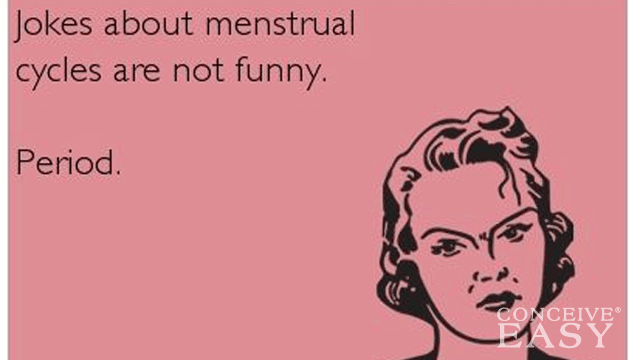![]() The information provided by our expert should not constitute a diagnosis of your condition. Always consult a medical practitioner or healthcare provider for a formal diagnosis. By making use of this content, you agree that ConceiveEasy and the expert assume no liability.
The information provided by our expert should not constitute a diagnosis of your condition. Always consult a medical practitioner or healthcare provider for a formal diagnosis. By making use of this content, you agree that ConceiveEasy and the expert assume no liability.

Your period. Chances are it’s been a thorn in your side since your early teenage years, wreaking havoc and causing trouble where it’s not welcome. While your period isn’t often the most fun thing in your life, when you get older, it’s much more important. In fact, your period is key to your fertility. Claim Your 20 Free Pregnancy Tests – Click Here

Your period is so much more than just a monthly nuisance. The first day of your period marks the first day of your cycle, the beginning of the body getting ready for possible pregnancy. During the first part of the cycle, the follicle that contains the egg begins to mature and grow.
The mature egg is released at the start of ovulation, and then the egg has the possibility to be fertilized to create a pregnancy. If fertilization does not occur, the uterine lining will shed, around two weeks after ovulation, and the woman’s period will occur.
So, as you can see, periods are related to your entire cycle, and can be a good indicator if your reproductive system is working properly.

There are many different things that are considered to be normal when it comes to a woman’s period. A cycle that lasts anywhere from 21 to 35 days is considered normal, and lets you know that your hormones and body functions are balanced and working properly.
However, a short cycle is considered to be a cycle that lasts less than 21 days. They can indicate a problem, such as a lack of eggs, or an early onset of menopause. A longer cycle, one more than 35 days.
A long cycle indicates that ovulation is not occurring in a regular or consistent manner. If you have a long or short cycle, you should see your doctor to try to figure out what is going on.

The most important thing that you can do is to track your menstrual cycles and pay attention to them. Figure out how long your cycles are, figure out how long your menstrual periods are, and then go from there. It is important to pay attention to your periods, because they can give you an inside look at what is going on inside your body and can also help to give you a better understanding of how your fertility might be.
If, for any reason, you have concerns about your periods, whether they are too short, too long, too light, too heavy, or anything else that just doesn’t seem “normal” to you, go ahead and talk to your doctor about it and see if you can figure out what exactly is going on.










Comments